Table of Contents
WordPress document collaboration is how content teams draft, review, edit, and publish content on a WordPress-powered website. This process improves the content quality which enables brands to relay their message effectively to their audience.
Authors, editors, reviewers, and publishers collaborate extensively on WordPress documents from ideation to publication to ensure it hits the mark.
However, document collaboration for WordPress content teams has been slow and tiresome, until recently.
Before we reveal the new and efficient WordPress document collaboration process, let’s take a quick look at how it was.
What typical WordPress document collaboration looks like
The term “WordPress document collaboration” is a misnomer because most of it takes place outside the WordPress editor. Content teams tend to rely on third-party document collaboration tools such as Google Docs and MS Word to work on drafts together.
Although it is a step up from document collaboration via emails, video calls, or team messaging tools, these third-party tools brought the following challenges:
- These apps were text editors which makes it difficult for WordPress content teams to collaborate on videos and dynamic content such as image carousels, CTA blocks, etc.
- While collaborating with external members, teams have to give them unrestricted access during the review phases to collect feedback which makes data security difficult.
- Back and forth of content between Google Docs and the Gutenberg editor during the approval phase makes the whole process inefficient.
Fortunately, Multicollab, a WordPress document collaboration plugin, solves the above issues to help content teams produce better content faster.
Effective WordPress document collaboration with Multicollab
Multicollab moves the WordPress document collaboration process to WordPress by enabling Google Docs-style editorial commenting in the Gutenberg Editor. Consequently, internal and external content team members can create, edit, and review drafts together in WordPress.
Let’s take a look at some of the salient features of Multicollab and how they simplify WordPress document collaboration.
1. Comment, suggest, and tag in the Gutenberg Editor
One of the reasons why tools like Google Docs are widely adopted is because they facilitate asynchronous collaboration. With Multicollab, you can enjoy those exact collaborative functionalities on the WordPress Gutenberg Editor.
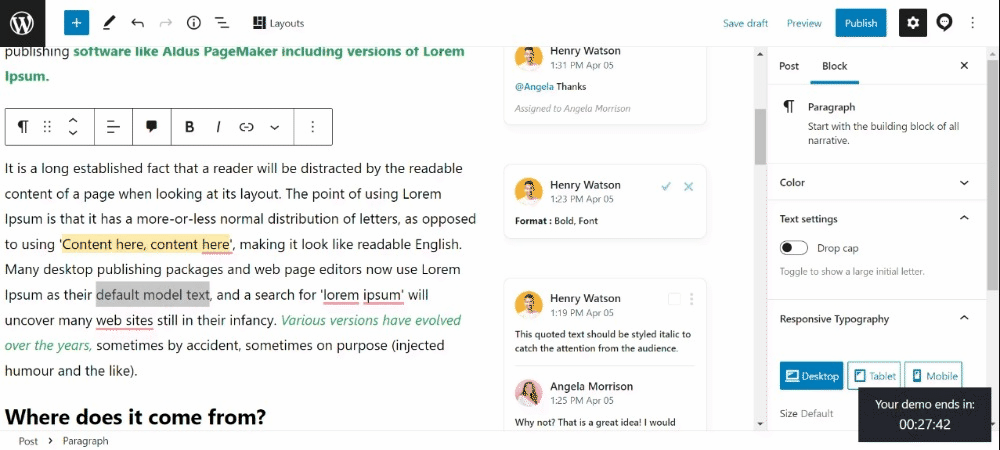
This will reduce your dependency on third-party document collaboration apps and simplify your WordPress editorial workflow which will make your overall process faster.
2. Review videos and dynamic content
Before Multicollab, content teams had to rely on video conferencing tools, team messaging apps, and email during WordPress document collaboration involving multimedia which was time-consuming, to say the least.
Unlike third-party content collaboration tools, the Gutenberg editor is a blog editor. With Multicollab, you can exchange feedback on various kinds of content, including videos, image carousels, social media post widgets, etc.
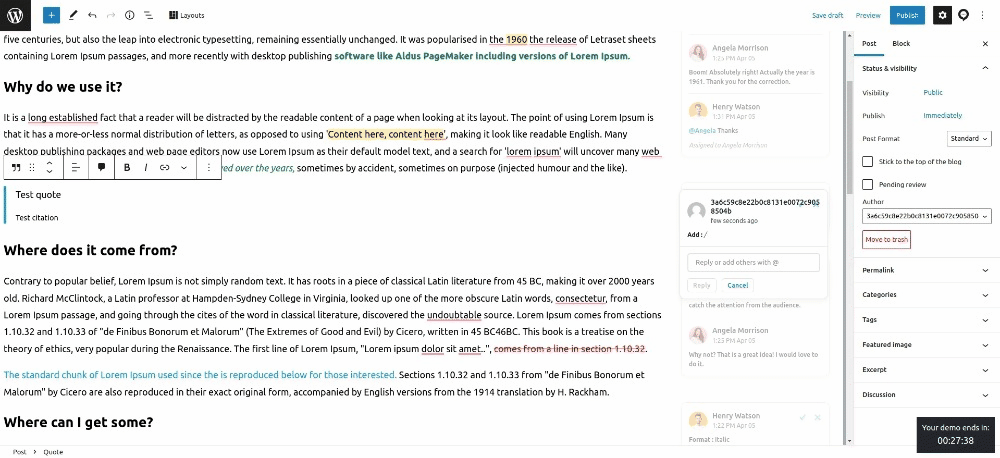
As a result, you and your team will spend less time and effort on communication apps during the review phase especially while exchanging feedback on videos and dynamic content.
3. Create custom roles and permissions
We mentioned above how WordPress content teams have to give external members unrestricted access to their organizational files during the review phase. Although this works, it definitely increases the chances of a data breach.
For instance, you might share a folder that contains certain confidential information by mistake.
On top of that, you will have to constantly monitor the changes in these files and folders throughout the content production workflow to ensure everything is in the right place.
Multicollab solves this challenge by allowing you to add external collaborators in WordPress where they can directly share their feedback. You can easily manage the permissions of these members through different phases of content development.
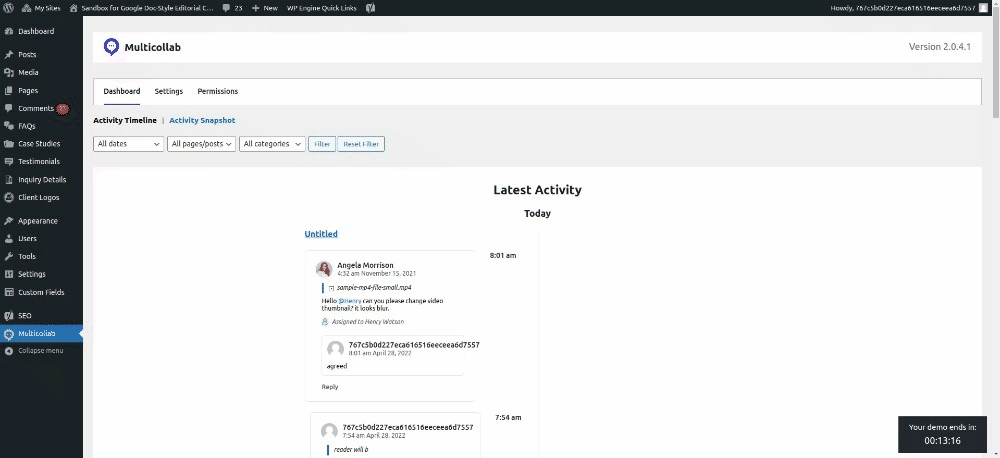
You can also create custom roles and set permissions for them based on your needs.
4. Track changes in all drafts at once
For larger content teams that work on multiple drafts simultaneously, it can be difficult to track comments and suggestions in all of them. It would be much better for teams if they can get all the recent suggestions at once.
Multicollab facilitates that by bringing all the recent edits, comments, and suggestions in its dashboard throughout WordPress document collaboration at all phases.
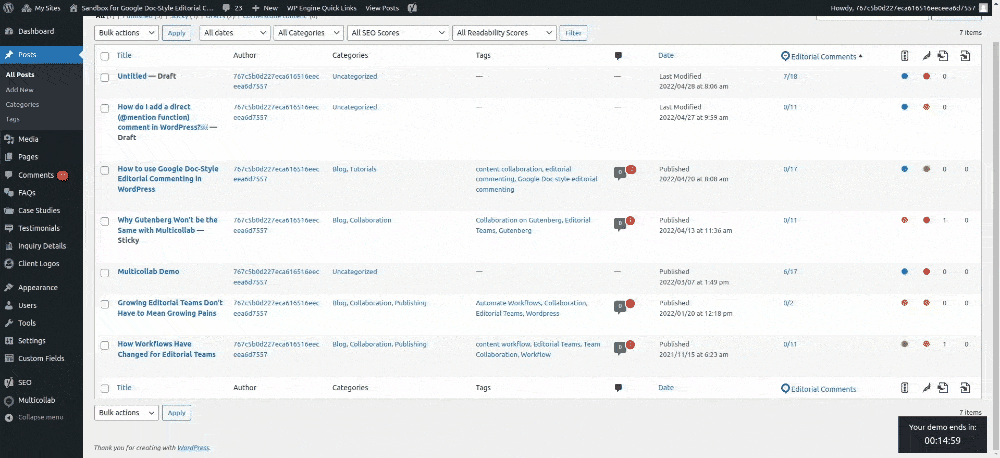
While editing or sharing your feedback on a draft, you can also access all of the comments other collaborators have made on it in the past. This will allow you to avoid repeating mistakes.
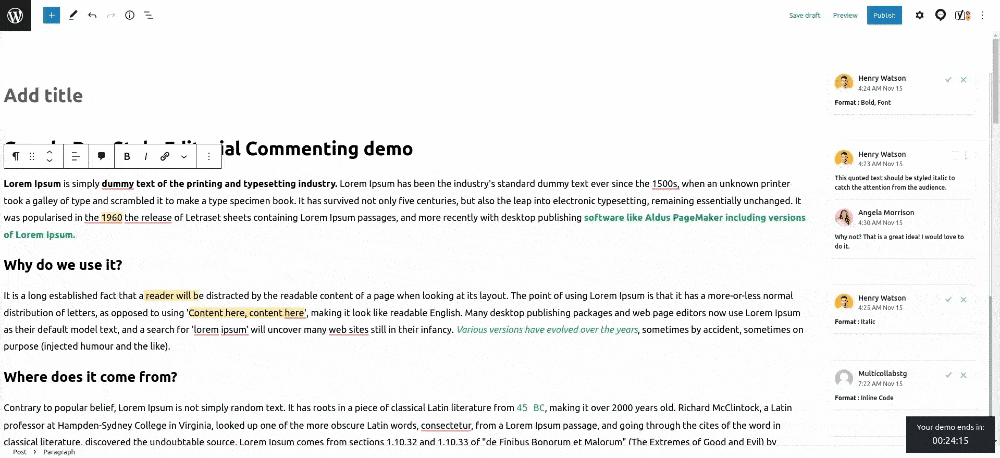
The future of WordPress document collaboration with Multicollab
Multicollab is committed to helping content teams over the world simplify their WordPress document collaboration process. Apart from the above functionalities, WordPress content teams can look forward to the following with Multicollab:
- Email notifications to keep you updated about the ongoing review process in real-time.
- Slack integration so you and your team can get updates without opening WordPress.
- Attach documents to a comment to share additional information while exchanging feedback.
- Multilingual support in various languages including Hindi, Chinese, German, etc., for distributed teams.
- Premium support from the Multicollab team is committed to resolving your specific queries within 24 hours.
Whether it is small content teams or large enterprises, the WordPress document collaboration process helps various internal and external team members work together to produce engaging content for their audience.
Multicollab simplifies that process by enabling Google Docs-style collaboration in the Gutenberg Editor. This reduces dependency on third-party content editing apps and synchronous communication tools, leading to improved speed and efficiency while securing your organizational data.
How fast and efficient?
Multicollab helps you publish content about 2x faster!
FAQs:
1. Can you collaborate on WordPress?
Yes. Multicollab enables teams to collaborate on WordPress just as they do in content editing tools such as Google Docs.
2. Can two people edit in WordPress?
Yes. Depending on the allowed permissions, two or more people can edit a content piece in WordPress.
3. Why is WordPress a collaborative tool?
Although WordPress doesn’t come with any native collaborative features, the flexibility of the platform allows collaboration. For instance, you can install Multicollab, a WordPress document collaboration plugin that enables Google Docs-style collaboration in the Gutenberg Editor.
4. How does collaborative document editing work?
Collaborative document editing refers to the process where multiple team members work together on a single draft.
5. What is the most common collaborative tool?
WordPress teams use third-party tools for collaboration. However, with Multicollab, they can collaborate on documents in WordPress.






